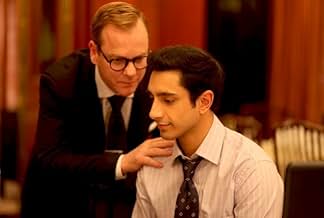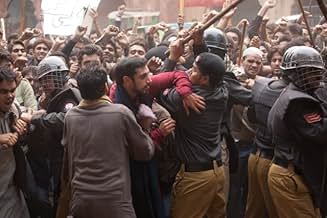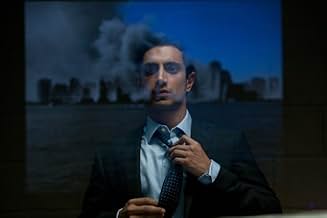IMDb रेटिंग
6.8/10
15 हज़ार
आपकी रेटिंग
वॉल स्ट्रीट पर कॉर्पोरेट सफलता का पीछा करने वाला एक युवा पाकिस्तानी व्यक्ति खुद को अपने अमेरिकी सपने, एक बंधक संकट और अपने परिवार की मातृभूमि के स्थायी कॉल के बीच संघर्ष में उलझा हुआ पाता है... सभी पढ़ेंवॉल स्ट्रीट पर कॉर्पोरेट सफलता का पीछा करने वाला एक युवा पाकिस्तानी व्यक्ति खुद को अपने अमेरिकी सपने, एक बंधक संकट और अपने परिवार की मातृभूमि के स्थायी कॉल के बीच संघर्ष में उलझा हुआ पाता है.वॉल स्ट्रीट पर कॉर्पोरेट सफलता का पीछा करने वाला एक युवा पाकिस्तानी व्यक्ति खुद को अपने अमेरिकी सपने, एक बंधक संकट और अपने परिवार की मातृभूमि के स्थायी कॉल के बीच संघर्ष में उलझा हुआ पाता है.
- पुरस्कार
- कुल 3 जीत
Imaaduddin Shah
- Sameer
- (as Imaad Shah)
Christopher Nicholas Smith
- Mike Rizzo
- (as Chris Smith)
Madhavan
- Bandy Uncle
- (as a different name)
फ़ीचर्ड समीक्षाएं
Four years after I read the impressive novel by Mohsin Hamid, I went to see the film which is based on the book. I wondered how a novel, which is essentially one long monologue by an educated Pakistani called Changez Khan with no other voices whatsoever, would be turned into a big screen offering but reckoned that, if they could do it for such complex works as "Life Of Pi" and "Cloud Atlas", it could work for Hamid's subtle narrative. So it proved.
The 'conversation' in Lahore has been effectively opened out with shooting not just in Pakistan and India but the United States and Turkey, while very effective use is made of music, starting with a dramatic opening scene. The essential clash of cultures, via a confrontation between the reluctant fundamentalist (played by Riz Admed) and the ambiguous American Bobby (Liev Schreiber), is retained, but the film is less opaque than the book, with it being (eventually) much clearer where the two main protagonists stand in the 'war on terror'.
Although the political messages are signposted more simplistically in the film than in the novel, this is still a work that challenges preconceptions about the capitalist West and the religious East and ultimately about ends versus means and good versus evil. Considerable credit should go to Indian director Mira Nair ("Monsoon Wedding" - another culture-conflict movie) and, as well as the excellent main roles, there is strong support in minor roles filled by Kiefer Sutherland and Kate Hudson. Although the turning point for Changez is the attack on the Twin Towers, subsequent events in Afghanistan, Iraq and elsewhere have only served to underline the need for a better understanding of what motivates fundamentalism and how best it should be opposed.
So do see "Zero Dark Thirty" (which I thought was excellent), but also take the trouble to find the much less high profile film "The Reluctant Fundamentalist". At one point in the movie, Changez is asked by an American official: "How do you feel about the United States of America?" It is not a simple question. This film does not offer a simple answer.
The 'conversation' in Lahore has been effectively opened out with shooting not just in Pakistan and India but the United States and Turkey, while very effective use is made of music, starting with a dramatic opening scene. The essential clash of cultures, via a confrontation between the reluctant fundamentalist (played by Riz Admed) and the ambiguous American Bobby (Liev Schreiber), is retained, but the film is less opaque than the book, with it being (eventually) much clearer where the two main protagonists stand in the 'war on terror'.
Although the political messages are signposted more simplistically in the film than in the novel, this is still a work that challenges preconceptions about the capitalist West and the religious East and ultimately about ends versus means and good versus evil. Considerable credit should go to Indian director Mira Nair ("Monsoon Wedding" - another culture-conflict movie) and, as well as the excellent main roles, there is strong support in minor roles filled by Kiefer Sutherland and Kate Hudson. Although the turning point for Changez is the attack on the Twin Towers, subsequent events in Afghanistan, Iraq and elsewhere have only served to underline the need for a better understanding of what motivates fundamentalism and how best it should be opposed.
So do see "Zero Dark Thirty" (which I thought was excellent), but also take the trouble to find the much less high profile film "The Reluctant Fundamentalist". At one point in the movie, Changez is asked by an American official: "How do you feel about the United States of America?" It is not a simple question. This film does not offer a simple answer.
What a shame, though how predictable, that the multiplexes chose not to show Mira Nair's brave and provocative political thriller about the intricacies of fighting extremist Islam.
Nair uses Mohsin Hamid's fictional novel to explore very real Western attitudes towards the East in the ongoing 'war on terror'. She has directed a film of huge cultural, political and moral significance at a critical juncture between the Muslim and non-Muslim world.
Rising star Riz Ahmed (Four Lions) gives a memorable lead performance as Changez, a Pakistani immigrant in New York, who has an identity crisis in the wake of 9/11. He returns to live in Lahore when an MIT professor has been captured and held ransom there by terrorists, who use him as leverage to make demands of the US.
Posing as a journalist, Secret Service Agent Bobby Lincoln (Liev Schreiber) visits Lahore to interview Changez, who has developed a reputation for being anti-American. The US authorities believe that Changez, if not a terrorist, at least knows something about the kidnapping. They exert pressure on him by harassing his family, a move which only deepens his hatred.
During their interview, Changez asks Bobby to make a judgement about him only after hearing his entire story, and Changez's reminiscence allows for the film to unfurl as a flashback of epic proportions.
Raised in a secular, literate Muslim household in Pakistan, Changez finds it easy to break the covenants of his religion. He consumes alcohol, eats pork and sleeps with non-Muslims, everything Islam forbids. He wins a scholarship to study at Princeton in the late 90s, where he claims never to have scored a B.
There he is headhunted to work for a prestigious valuation firm where he ensures a rapid promotion by impressing his boss (Kiefer Sutherland). On the day of his promotion the towers come down. He tells Bobby that instead of feeling sadness, he felt awe. 'David had struck Goliath'.
Ahmed gave his most famous performance in Lions, but this is his greatest. As an 'Asian' (I abhor the term but include it for your convenience) man myself, I have long had to suffer stereotypical performances by brown-skinned actors, who are used by ignorant directors to add colour and Schadenfreude to their ignorant stories. Ahmed transcends all that. This time we're analysing the reactions of White actors.
Changez's hatred of America germinates slowly, against his will, as his life slowly falls apart. Colleagues turn on him. The bond he had with his widowed girlfriend Erica (Kate Hudson) withers. Ordinary citizens view him as the enemy. His choice to move back to Pakistan is made for him.
Nair purposely shows much of Changez's life back home, as one of her clear aims is to challenge some key stereotypes. Changez's father (Om Puri) is a distinguished poet, not a farmer or rickshaw puller. The family is quite well off, not destitute. And the country is generally shown to be colourful, vibrant and civilised, instead of corrupt, backward and dangerous, as we normally see.
The horror of the recent Woolwich (London) terrorist attack may do something to restrict the impact of this excellent film. Paradoxically, the attack serves to reinforce the arguments of the film. It makes several points, makes them powerfully and forces you to in future question what you are told.
Nair uses Mohsin Hamid's fictional novel to explore very real Western attitudes towards the East in the ongoing 'war on terror'. She has directed a film of huge cultural, political and moral significance at a critical juncture between the Muslim and non-Muslim world.
Rising star Riz Ahmed (Four Lions) gives a memorable lead performance as Changez, a Pakistani immigrant in New York, who has an identity crisis in the wake of 9/11. He returns to live in Lahore when an MIT professor has been captured and held ransom there by terrorists, who use him as leverage to make demands of the US.
Posing as a journalist, Secret Service Agent Bobby Lincoln (Liev Schreiber) visits Lahore to interview Changez, who has developed a reputation for being anti-American. The US authorities believe that Changez, if not a terrorist, at least knows something about the kidnapping. They exert pressure on him by harassing his family, a move which only deepens his hatred.
During their interview, Changez asks Bobby to make a judgement about him only after hearing his entire story, and Changez's reminiscence allows for the film to unfurl as a flashback of epic proportions.
Raised in a secular, literate Muslim household in Pakistan, Changez finds it easy to break the covenants of his religion. He consumes alcohol, eats pork and sleeps with non-Muslims, everything Islam forbids. He wins a scholarship to study at Princeton in the late 90s, where he claims never to have scored a B.
There he is headhunted to work for a prestigious valuation firm where he ensures a rapid promotion by impressing his boss (Kiefer Sutherland). On the day of his promotion the towers come down. He tells Bobby that instead of feeling sadness, he felt awe. 'David had struck Goliath'.
Ahmed gave his most famous performance in Lions, but this is his greatest. As an 'Asian' (I abhor the term but include it for your convenience) man myself, I have long had to suffer stereotypical performances by brown-skinned actors, who are used by ignorant directors to add colour and Schadenfreude to their ignorant stories. Ahmed transcends all that. This time we're analysing the reactions of White actors.
Changez's hatred of America germinates slowly, against his will, as his life slowly falls apart. Colleagues turn on him. The bond he had with his widowed girlfriend Erica (Kate Hudson) withers. Ordinary citizens view him as the enemy. His choice to move back to Pakistan is made for him.
Nair purposely shows much of Changez's life back home, as one of her clear aims is to challenge some key stereotypes. Changez's father (Om Puri) is a distinguished poet, not a farmer or rickshaw puller. The family is quite well off, not destitute. And the country is generally shown to be colourful, vibrant and civilised, instead of corrupt, backward and dangerous, as we normally see.
The horror of the recent Woolwich (London) terrorist attack may do something to restrict the impact of this excellent film. Paradoxically, the attack serves to reinforce the arguments of the film. It makes several points, makes them powerfully and forces you to in future question what you are told.
For those who have read Mohsin Hamid's brilliant novel on which this film is based the story will be easier to follow than the somewhat disconnected screenplay that was written by Hamid with Ami Boghani and William Wheeler. Mira Nair directs, and knowing her previous work suggests that it is this very disconnect that she wishes to emphasize in this profoundly moving film - in these times of global unrest and fear because of terrorist acts we don't know who to trust and who to dislike, but the answer is that there is no right or wrong. Nair achieves this by beginning her film with a conversation between an American journalist Bobby (Liev Schreiber) and a Pakistani professor Changez (Riz Ahmed) in a setting of high tension in a bar in Lahore and our initial belief is that the Bobby represents the core we trust and with whom we identify, that Changez is the unknown 'different culture' stranger who is suspect. In the course of the film that position is deeply altered. And that is where the power of the message is so affecting. But we must go through flashbacks of eleven years to understand the real drama.
Changez Khan (the very handsome and very fine actor Riz Ahmed) lives with his poet father Abu (Om Purl) and mother Ammi (Shabana Azmi) in Pakistan. The family is poor but educated and Changez decides to go to America to find his place in the corporate world of money and success - and help support his family (his sister is ready to marry but the family can ill afford a traditional wedding). Changez arrives in America, attends university, and rises rapidly, gaining a position with a Wall Street company that specializes in financial advising for business internationally. The head of the company Jim Cross (Kiefer Sutherland) personally picks Changez after testing his skills and sends Changez on missions to the Philippines etc where he examines the finances, cuts waste (and jobs of workers) and makes the businesses run efficiently, increase profits, but sacrificing the working class. On one such mission Changez is asked to analyze a publishing house in Istantbul, the owner Nazmi (Haluk Bilginer) has translated Changez' fathers poetry into Turkish, and pleads with Changez not to destroy his publishing house. Cross demands Changez shut it down and Changez refuses and submits his resignation. As he prepares to pack to return, jobless, to the US he is watching television and the twin towers of 9/11 are being attacked. His attempts to return to the US are met with police and airport interrogations since he is not a native born American, and this allows the viewer to witness the horrible and demeaning treatment 'foreigners' received in the wake of 9/11.
Changez does return to New York and has another setback with his photographer artist girlfriend Erica (Kate Hudson), herself deeply bruised by the loss of her lover in a car crash she caused in the recent past, who has an art opening that includes videos and images of bits of conversation she has shared with Changez - information which in the exhibition further underlines the concept of Changez as a potential terrorist. Changez flees to Pakistan, becomes an anti-violence but fiery professor whose students seek to rid their Pakistan of the American intruders. And this is where the conversation at film's beginning ultimately makes sense (it is now 2011). The manner in which the film ends is left for the viewer to experience. As in the book there are many sidebar stories and characters that underline the stories of both Bobby (who has been talked into joining the CIA) and Changez who moves from his love of the American Dream and his sweetheart, to his spiritual commitment to his Pakistan. These characters, as well as many others in this film, allow us to see there is no one way to view acts as right or wrong. It is all perception and hopefully this brilliant film will assist us in understanding the confusion that deeply affects us all everyday as we walk around the topic of terrorism. Grady Harp, May 13
Changez Khan (the very handsome and very fine actor Riz Ahmed) lives with his poet father Abu (Om Purl) and mother Ammi (Shabana Azmi) in Pakistan. The family is poor but educated and Changez decides to go to America to find his place in the corporate world of money and success - and help support his family (his sister is ready to marry but the family can ill afford a traditional wedding). Changez arrives in America, attends university, and rises rapidly, gaining a position with a Wall Street company that specializes in financial advising for business internationally. The head of the company Jim Cross (Kiefer Sutherland) personally picks Changez after testing his skills and sends Changez on missions to the Philippines etc where he examines the finances, cuts waste (and jobs of workers) and makes the businesses run efficiently, increase profits, but sacrificing the working class. On one such mission Changez is asked to analyze a publishing house in Istantbul, the owner Nazmi (Haluk Bilginer) has translated Changez' fathers poetry into Turkish, and pleads with Changez not to destroy his publishing house. Cross demands Changez shut it down and Changez refuses and submits his resignation. As he prepares to pack to return, jobless, to the US he is watching television and the twin towers of 9/11 are being attacked. His attempts to return to the US are met with police and airport interrogations since he is not a native born American, and this allows the viewer to witness the horrible and demeaning treatment 'foreigners' received in the wake of 9/11.
Changez does return to New York and has another setback with his photographer artist girlfriend Erica (Kate Hudson), herself deeply bruised by the loss of her lover in a car crash she caused in the recent past, who has an art opening that includes videos and images of bits of conversation she has shared with Changez - information which in the exhibition further underlines the concept of Changez as a potential terrorist. Changez flees to Pakistan, becomes an anti-violence but fiery professor whose students seek to rid their Pakistan of the American intruders. And this is where the conversation at film's beginning ultimately makes sense (it is now 2011). The manner in which the film ends is left for the viewer to experience. As in the book there are many sidebar stories and characters that underline the stories of both Bobby (who has been talked into joining the CIA) and Changez who moves from his love of the American Dream and his sweetheart, to his spiritual commitment to his Pakistan. These characters, as well as many others in this film, allow us to see there is no one way to view acts as right or wrong. It is all perception and hopefully this brilliant film will assist us in understanding the confusion that deeply affects us all everyday as we walk around the topic of terrorism. Grady Harp, May 13
Whilst it is tempting to dismiss this as just another 9/11 related tale, it goes a little deeper than one might think.
A young Pakistani whose upward path to wealth in the finance industry in New York is interrupted by the atrocities of September 11, 2001 who then becomes the Asian looking man with a beard, the centre of everyone's suspicions. The country he had come to grow so fond of, suddenly puts him in a dark corner, which raises some uneasy questions; is hatred the response to hatred, or extremism the cure to extremism? A single event, with a chain of events that followed caused him to question everything.
This is a story about two extremes. On the one hand is the religious fundamentalism which drives people to kill for the sake of dogma and blind obedience to a book whilst on the other hand lies the financial fundamentalism which drives people to gamble the livelihoods of others for the sake of individual profit maximisation and wealth accumulation. The former type of extremism is well noted and condemned, whilst the latter is noted but not so openly condemned although it is possible that it is causing more damage than religious fundamentalism. Regardless where one stands on such issues this film puts a young man in the middle of two extremes.
Changez is a conflicted soul and whilst he starts out as a financial fundamentalist, should he not swap one extreme for another? Can he realise that fanaticism is harmful no matter whichever root it has?
An interesting, and very relevant film.
A young Pakistani whose upward path to wealth in the finance industry in New York is interrupted by the atrocities of September 11, 2001 who then becomes the Asian looking man with a beard, the centre of everyone's suspicions. The country he had come to grow so fond of, suddenly puts him in a dark corner, which raises some uneasy questions; is hatred the response to hatred, or extremism the cure to extremism? A single event, with a chain of events that followed caused him to question everything.
This is a story about two extremes. On the one hand is the religious fundamentalism which drives people to kill for the sake of dogma and blind obedience to a book whilst on the other hand lies the financial fundamentalism which drives people to gamble the livelihoods of others for the sake of individual profit maximisation and wealth accumulation. The former type of extremism is well noted and condemned, whilst the latter is noted but not so openly condemned although it is possible that it is causing more damage than religious fundamentalism. Regardless where one stands on such issues this film puts a young man in the middle of two extremes.
Changez is a conflicted soul and whilst he starts out as a financial fundamentalist, should he not swap one extreme for another? Can he realise that fanaticism is harmful no matter whichever root it has?
An interesting, and very relevant film.
10beattyg
As soon as I saw the early credits running right to left I was grabbed by the intelligent Mira Nair, then the rousing singers, sumptuous visuals, disparate actors woven together in this complex, compelling story... wow. The Reluctant Fundamentalist is why I love cinema. This movies imperfections are perfection.
I read Mohsin Hamids exquisite book prior to viewing this fine movie and I almost side- stepped this movie because I didn't feel Hamids books subtle yet intense conversation would be translated onto the big screen. How wrong I was - thank you Mira Nair and all those involved.
I walked out of this movie and clicked my heels - the sun was shining and the world was travelling just fine in far more places than most realise.
I read Mohsin Hamids exquisite book prior to viewing this fine movie and I almost side- stepped this movie because I didn't feel Hamids books subtle yet intense conversation would be translated onto the big screen. How wrong I was - thank you Mira Nair and all those involved.
I walked out of this movie and clicked my heels - the sun was shining and the world was travelling just fine in far more places than most realise.
क्या आपको पता है
- ट्रिविया"Changez" is a Pakistani version of Genghis, from Genghis Khan.
- गूफ़In Chang's flashback to 2001, Erica takes a photo with her Canon EOS 5D, but the camera was not announced by Canon until 2005.
- कनेक्शनFeatured in At the Movies: Venice Film Festival 2012 (2012)
- साउंडट्रैकKangna
Performed by Fareed Ayaz and Abu Muhammad
Written by Unknown/Traditional Folk Song
Produced by Rohail Hyatt
Tabla Player Ali Akbar
Dholak Player Gayoor Ahmed
Chorus Ghulum Akram, Moiz Uddin
Small Vocalist Fattah Ul Khair
टॉप पसंद
रेटिंग देने के लिए साइन-इन करें और वैयक्तिकृत सुझावों के लिए वॉचलिस्ट करें
- How long is The Reluctant Fundamentalist?Alexa द्वारा संचालित
विवरण
बॉक्स ऑफ़िस
- US और कनाडा में सकल
- $5,52,959
- US और कनाडा में पहले सप्ताह में कुल कमाई
- $30,920
- 28 अप्रैल 2013
- दुनिया भर में सकल
- $21,76,576
- चलने की अवधि2 घंटे 10 मिनट
- रंग
- ध्वनि मिश्रण
- पक्ष अनुपात
- 2.35 : 1
इस पेज में योगदान दें
किसी बदलाव का सुझाव दें या अनुपलब्ध कॉन्टेंट जोड़ें




































